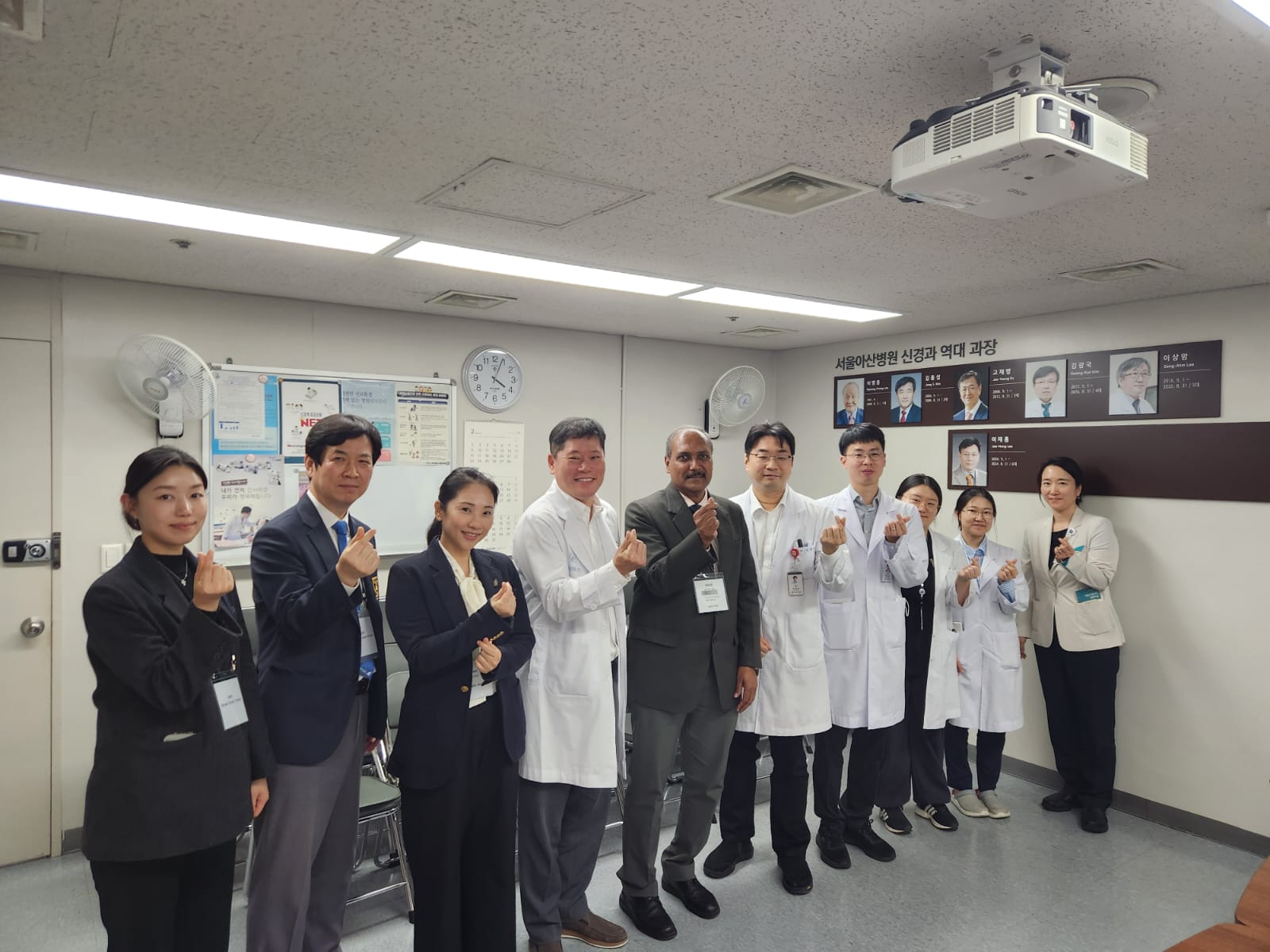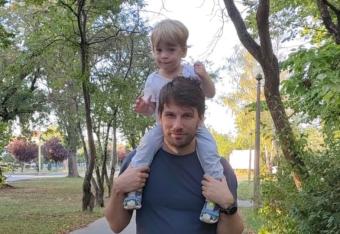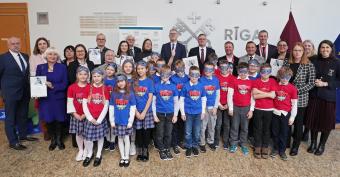In March 2025, World Stroke Organization (WSO) president Prof. Jeyaraj Durai Pandian joined leading local experts for a two-day programme to explore opportunities for cooperation between the WSO and two local societies, the Korean Stroke Society (KSS) and the Korean Neuroendovacsular Society (KoNES).
This landmark event was facilitated by the Angels Initiative with the aim of fostering a connection between the WSO and the Korean stroke community. Having functioned as a bridge for collaboration between KoNES and the KSS, the Angels team in Korea also hoped that the involvement of the WSO would encourage the two bodies to join forces in the fight against stroke.
Meetings with the advisory board of each society followed a tour of two of South Korea’s most prestigious hospitals, the top-ranked Asan Medical Center and Seoul National University Bundang Hospital (SNUBH).
Stroke is the fourth leading cause of death in South Korea, affecting 110,000 new patients per year. Stroke incidence in patients older that 85 has doubled in the past decade. Although the absolute number of stroke cases has increased, mortality rates have decreased as a result of improved management and treatment.
In contrast with most other countries, comprehensive stroke centres vastly outnumber primary centres: mechanical thrombectomy is available at 77 of the 88 accredited stroke centres. In the meeting with KoNES on 13 March, a ten-year overview of treatment trends for acute ischaemic stroke examined the steep rise in mechanical thrombectomy. Prof. Pandian presented a review of ESO guidelines for thrombectomy and thrombolysis, as well as updates from the International Stroke Congress held in Los Angeles during February.
Next on the agenda, a focus on stroke registries considered the potential for cooperation between RES-Q and a yet to be established KoNES registry, and highlighted the impact of the WSO Angels Awards on stroke care quality monitoring.
The final topic explored differences and similarities between the KoNES and WSO stroke certification systems, and further opportunities for collaboration including a public stroke awareness campaign.
The meeting with the Korean Stroke Society took place the following day and opened with an overview and discussion of the KSS and WSO certification systems. A comparison of the KSS and WSO stroke registries followed. As of 2024, 97 hospitals participate in the Korean Stroke Registry, data from which shows a recanalization rate of 16,3 percent, with thrombectomy rates slightly ahead of thrombolysis. The potential for interaction of the Korean Stroke Registry with RES-Q was discussed along with opportunities for collaborating on global research through data sharing and analysis.
The meeting concluded with a comparative discussion of stroke care strategies that included ways to address regional variations in stroke care, reduce door-to-treatment times, raise public awareness of stroke, and the role of the Angels Initiative.
The hospital tour that preceded the meetings showcased the innovation and advanced technology at two of the country’s most prominent hospitals. Seoul National University Bundang Hospital and Asan Medical Center are often cited in global rankings. SNUBH is a branch of Seoul National University Hospital which traces its history back to 1885 when, initially named Jejung Hospital, it was established with the goal of modernizing medicine in the country. Today, SNUHB is one of six hospitals in South Korea that is ranked among the top 100 digital hospitals in the world. Its Neuroscience Centre is the country’s first intensive care unit specializing in neuroscience.
The hospital tour started with a stroke pathway walkthrough at SNUHB followed by a lecture during which Prof. Pandian introduced the WSO, World Stroke Academy and the Future Leaders program. Then the action moved to Asan Medical Centre, which as well as being the largest hospital in South Korea, is the teaching hospital of the University of Ulsan College of Medicine and, according to Newsweek, the 22nd best hospital in the world. A world-class digital hospital, it’s state-of-the-art stroke centre was opened in 2007.
Posting on LinkedIn, Prof. Pandian recalled these visits as follows: “I recently had the privilege of visiting two renowned hospitals in Seoul to observe their stroke programs. At Seoul National University Hospital, I met with the CEO, Prof. Bae, and other dedicated members of the stroke program team. I was truly impressed by the hospital’s excellent infrastructure and the well-established stroke care pathway, which ensures timely and effective reperfusion treatments for stroke patients. Additionally, I visited the Asan Medical Center stroke program, where I witnessed their commitment to delivering exceptional stroke care. Both institutions exemplify world-class standards in stroke management.”

Angels team leader Keonbae Cho said Prof. Pandian’s visit marked a significant milestone for stroke care in south Korea, and that the outcomes were already impacting the stroke landscape in the country. Among these, KoNES has begun exploring a collaboration between RES-Q and its own registry, and the FAST Heroes stroke awareness campaign will be launched at 31 schools in Ulsan City, with the support of Ulsan University Hospital, clinical home of KoNES president Prof. Soon Chan Kwon.
The KSS has agreed to team up with Angels for future community awareness events, including an online stroke awareness campaign on World Stroke Day. And in September, the KSS and Angels will launch the KSS 119 award to recognize excellence in prehospital stroke care.
The 119 emergency service has a key role in ensuring stroke patients are transferred to the right stroke care centers within the time window for treatment. By encouraging the highest standards in prehospital stroke care, it is believed that the awards will lead to reduced arrival times of stroke patients at hospitals, and shorter door-to-treatment times.
These and other partnerships are expected to lead to a brighter future for stroke patients across South Korea, and advance global efforts to improve stroke care.


